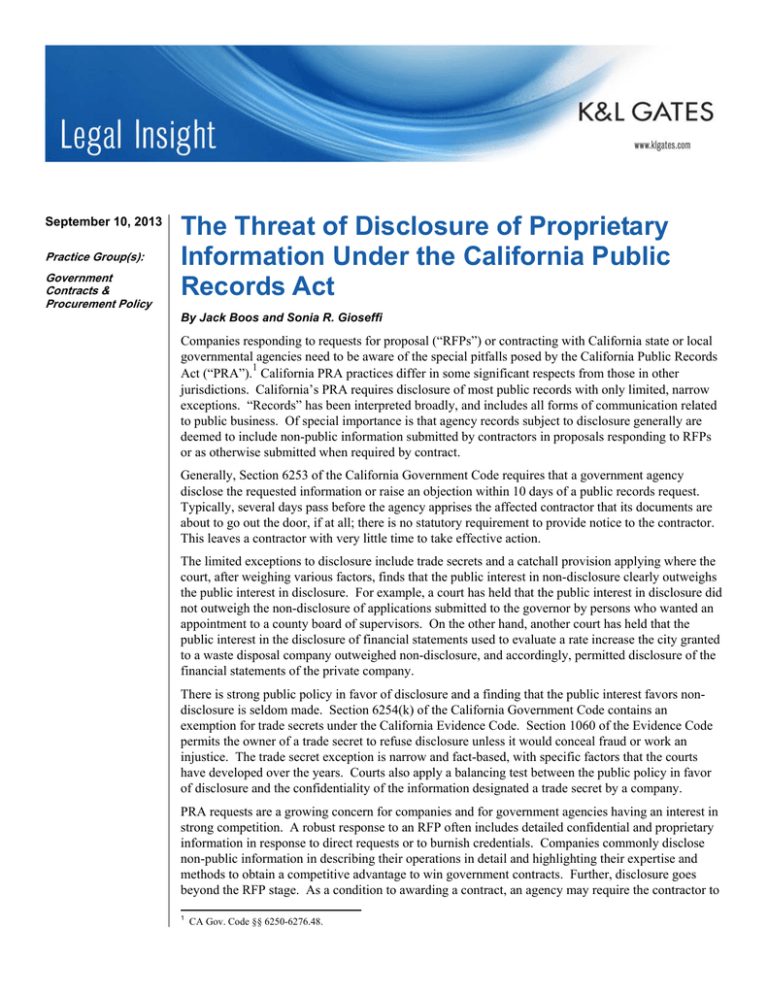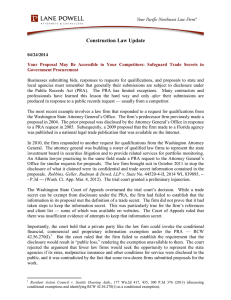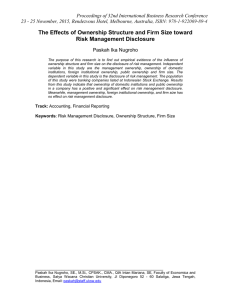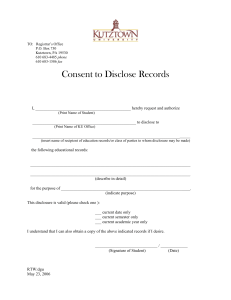
September 10, 2013
Practice Group(s):
Government
Contracts &
Procurement Policy
The Threat of Disclosure of Proprietary
Information Under the California Public
Records Act
By Jack Boos and Sonia R. Gioseffi
Companies responding to requests for proposal (“RFPs”) or contracting with California state or local
governmental agencies need to be aware of the special pitfalls posed by the California Public Records
1
Act (“PRA”). California PRA practices differ in some significant respects from those in other
jurisdictions. California’s PRA requires disclosure of most public records with only limited, narrow
exceptions. “Records” has been interpreted broadly, and includes all forms of communication related
to public business. Of special importance is that agency records subject to disclosure generally are
deemed to include non-public information submitted by contractors in proposals responding to RFPs
or as otherwise submitted when required by contract.
Generally, Section 6253 of the California Government Code requires that a government agency
disclose the requested information or raise an objection within 10 days of a public records request.
Typically, several days pass before the agency apprises the affected contractor that its documents are
about to go out the door, if at all; there is no statutory requirement to provide notice to the contractor.
This leaves a contractor with very little time to take effective action.
The limited exceptions to disclosure include trade secrets and a catchall provision applying where the
court, after weighing various factors, finds that the public interest in non-disclosure clearly outweighs
the public interest in disclosure. For example, a court has held that the public interest in disclosure did
not outweigh the non-disclosure of applications submitted to the governor by persons who wanted an
appointment to a county board of supervisors. On the other hand, another court has held that the
public interest in the disclosure of financial statements used to evaluate a rate increase the city granted
to a waste disposal company outweighed non-disclosure, and accordingly, permitted disclosure of the
financial statements of the private company.
There is strong public policy in favor of disclosure and a finding that the public interest favors nondisclosure is seldom made. Section 6254(k) of the California Government Code contains an
exemption for trade secrets under the California Evidence Code. Section 1060 of the Evidence Code
permits the owner of a trade secret to refuse disclosure unless it would conceal fraud or work an
injustice. The trade secret exception is narrow and fact-based, with specific factors that the courts
have developed over the years. Courts also apply a balancing test between the public policy in favor
of disclosure and the confidentiality of the information designated a trade secret by a company.
PRA requests are a growing concern for companies and for government agencies having an interest in
strong competition. A robust response to an RFP often includes detailed confidential and proprietary
information in response to direct requests or to burnish credentials. Companies commonly disclose
non-public information in describing their operations in detail and highlighting their expertise and
methods to obtain a competitive advantage to win government contracts. Further, disclosure goes
beyond the RFP stage. As a condition to awarding a contract, an agency may require the contractor to
1
CA Gov. Code §§ 6250-6276.48.
The Threat of Disclosure of Proprietary
Information Under the California Public
Records Act
disclose additional non-public information about its operations. Later, after the contract is in place,
the contractor may be contractually required to make ongoing disclosures about its confidential
operations.
The potential for abuse of the PRA is clear. PRA requests are recognized as an easy, inexpensive way
to gather non-public information. Originally, as envisioned by the legislature, PRA requests were
utilized by media and good-government groups looking to inform the public of government activities.
Now, requests are as often made by competitors and by data mining companies gathering information
for industry reports. This problem is not going away and in fact is becoming more troublesome; as
government agencies increasingly contract with private companies, competitors and data mining
companies will likely continue to increasingly exploit the PRA to obtain valuable confidential
information.
Generally, courts are inclined to interpret the PRA liberally, leaving little room for a company to
successfully assert an exception to prevent disclosure. In some bleak situations, there is not much that
can be done: once a public records request has been made, there can be scant opportunity for the
affected company to try to prevent the disclosure of its confidential and often proprietary information.
The courts are available to deal with disclosure issues in “Writ of Mandate” proceedings, but it takes
time to gather and present compelling arguments, which often have intensive factual as well as legal
dimensions.
At the front end, companies can take several proactive steps in anticipation of a PRA request before
disclosing information to the agency and once a public records request has been made. Before
responding to an RFP, companies need a clear and comprehensive understanding of how the PRA
works, including the specific exceptions to disclosure, and an assessment of how their proprietary
interests might be compromised by disclosure. With this in mind, they can make informed decisions
as to what to include in proposals submitted in responses to RFPs, and what not to include, and put the
agency on notice as to the sensitivity of the data.
So what can be done? Consistent with the aggressive pursuit of the contract, the selection of the
information to be disclosed in a response to an RFP should first be reviewed carefully by both the
company and its counsel in a damage assessment that weighs the usefulness of the information against
the impact of potential disclosure later. Then, at a minimum, any confidential information submitted
should be clearly marked as a “trade secret.” It is important to designate only the specific information
that is confidential as a “trade secret” and not to over-designate all information as a “trade secret.”
Before submitting information, a potential contractor should inquire as to whether the agency has a
policy in place for the handling of PRA requests. Some government agencies have well-developed
policies on how to request confidential treatment of documents and the processing of public records
requests.
To try to ensure that a company is timely made aware of a request for its confidential information,
ideally the governmental agency should be contractually required to notify the company upon the
receipt of a public records request. Most important, companies should have a strategy in place to
quickly address a public records request in the brief time permitted to raise an objection, including
detailed explanations as to any legitimate trade secret claims.
With an awareness of the PRA and a strategy in place to deal with potential public records requests, a
company can contract with government entities and have optimal chances of limiting the potential
disclosure of its proprietary information.
2
The Threat of Disclosure of Proprietary
Information Under the California Public
Records Act
For further information, please contact Jack Boos or Sonia Gioseffi at 415.882.8200.
Authors:
Jack Boos
jack.boos@klgates.com
+1.415.882.8005
Sonia R. Gioseffi
sonia.gioseffi@klgates.com
+1.415.882.8006
Anchorage Austin Beijing Berlin Boston Brisbane Brussels Charleston Charlotte Chicago Dallas Doha Dubai Fort Worth Frankfurt
Harrisburg Hong Kong Houston London Los Angeles Melbourne Miami Milan Moscow Newark New York Orange County Palo Alto Paris
Perth Pittsburgh Portland Raleigh Research Triangle Park San Diego San Francisco São Paulo Seattle Seoul Shanghai Singapore Spokane
Sydney Taipei Tokyo Warsaw Washington, D.C. Wilmington
K&L Gates practices out of 48 fully integrated offices located in the United States, Asia, Australia, Europe, the
Middle East and South America and represents leading global corporations, growth and middle-market companies,
capital markets participants and entrepreneurs in every major industry group as well as public sector entities,
educational institutions, philanthropic organizations and individuals. For more information about K&L Gates or its
locations, practices and registrations, visit www.klgates.com.
This publication is for informational purposes and does not contain or convey legal advice. The information herein should not be used or relied upon in
regard to any particular facts or circumstances without first consulting a lawyer.
©2013 K&L Gates LLP. All Rights Reserved.
3



